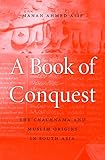A book of conquest : the Chachnama and Muslim origins in South Asia / Manan Ahmed Asif.
Material type: TextLanguage: English Publisher: Cambridge, Massachusetts : Harvard University Press, 2016Description: 1 online resource (xi, 250 pages) : illustrationsContent type:
TextLanguage: English Publisher: Cambridge, Massachusetts : Harvard University Press, 2016Description: 1 online resource (xi, 250 pages) : illustrationsContent type: - 9780674972414
- 0674972414
- Kūfī, ʻAlī ibn Ḥāmid, active 13th century. Chachnāmah
- Chachnāmah (Kūfī, ʻAlī ibn Ḥāmid)
- Islam and politics -- South Asia
- Islam -- South Asia -- Historiography
- South Asia -- Politics and government
- HISTORY -- Asia -- India & South Asia
- Islam and politics
- Islam -- Historiography
- Politics and government
- South Asia
- 954.91/8021 23
- BP173.7 .A4835 2016eb
- online - EBSCO
| Item type | Current library | Call number | URL | Status | Notes | Barcode | |
|---|---|---|---|---|---|---|---|
 eBook
eBook
|
Biblioteca "Angelicum" Pont. Univ. S.Tommaso d'Aquino Nuvola online | online - EBSCO (Browse shelf(Opens below)) | Online access | Not for loan (Accesso limitato) | Accesso per gli utenti autorizzati / Access for authorized users | (ebsco)1364289 |
How did Islam come to India? Why is this question of such great significance to formations of political thought in South Asia? This book examines the longue dureé history--from the early thirteenth century to the twenty-first--of a particular text, Chachnama, written in Uch Sharif. The Book of Chach (Chachnama) was written in 1226 CE and provided an account, in Persian, of the 712 CE conquest of Sind by the armies of Muhammad bin Qasim. This early regional history became the foundation for British colonial efforts to cast Muslim rule in India as one of despotic foreigners--a rule to be replaced by the benevolent British one. Asif explores an interconnected Indian Ocean geography which linked sailors, merchants, and literati across divisions of religion and polities. In Chachnama, we find one of the earliest articulation of a political theory that was demonstrably polyglossic, multivalent, and deeply embedded in both the Indic and the Islamic ethos. This examination of Chachnama informs a reconstruction of a intermingled political world at the heart of the text--a world that is subsequently recast by colonial historiography in terms of stark difference alone: Muslim invaders versus Hindu subjects. This work is a bold rearticulation of a medieval imagination that reconciled power and politics in ways that appear incongruous to our present day politics. It takes aim at the fundamental way in which the modern state of Pakistan imagines itself--as a polity ideologically founded in "712 A.D." by the "First Citizen" Muhammad bin Qasim, and has implications for our contemporary understanding of religious difference and theologically based nationalisms.-- Provided by publsiher.
Includes bibliographical references and index.
Frontier with the house of gold -- A foundation for history -- Dear son, what is the matter with you? -- A demon with ruby eyes -- The half smile -- A conquest of pasts.
Print version record.
In English.


